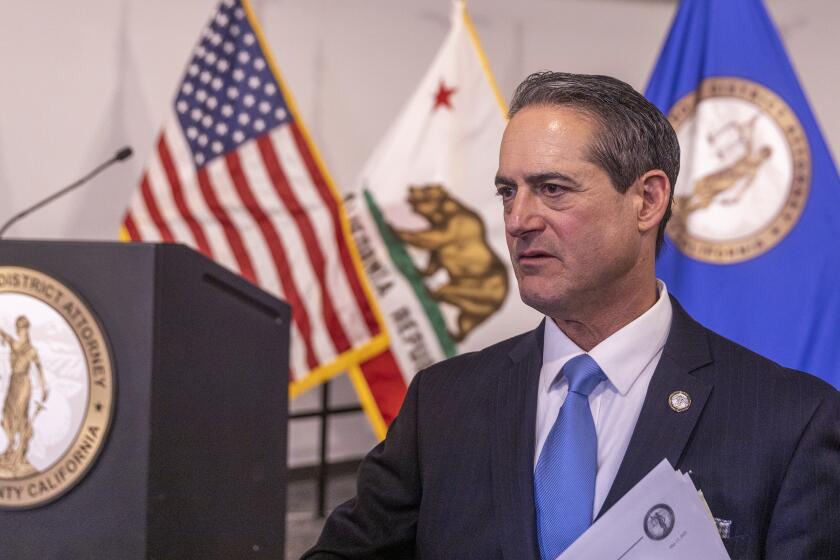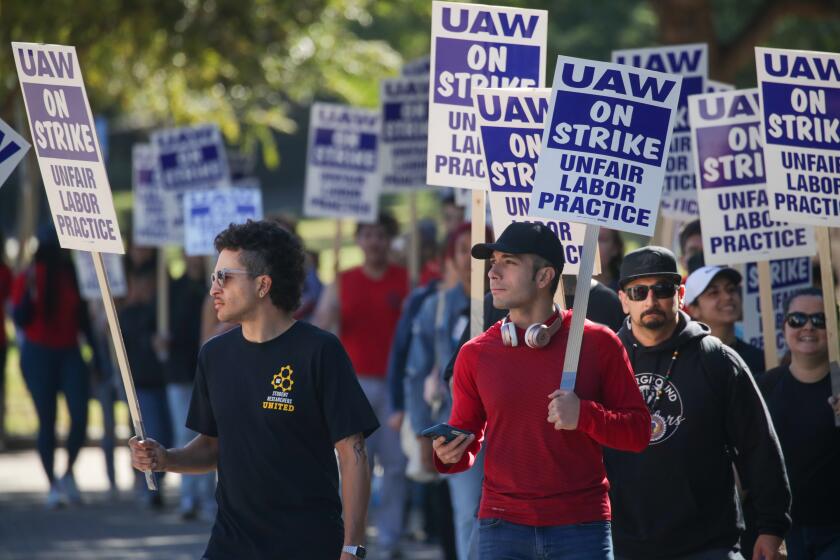Marlton Square Project Gets the Go-Ahead
The City Council approved the Marlton Square shopping and residential development in southwest Los Angeles on Friday despite reservations by some members about the city’s commitment of $38.5 million in public subsidies to the project.
The heads of the NAACP’s and Urban League’s Los Angeles chapters, as well as Assembly Speaker Herb Wesson (D-Culver City) were among the three dozen supporters of the project urging the council to act against blight in the Crenshaw/Baldwin Hills area.
For the record:
12:00 a.m. Nov. 17, 2002 For The Record
Los Angeles Times Sunday November 17, 2002 Home Edition Main News Part A Page 2 National Desk 3 inches; 107 words Type of Material: Correction
Shopping center name -- A California section story Saturday about the Los Angeles City Council unanimously approving the Marlton Square shopping and residential development in southwest Los Angeles incorrectly stated that the San Fernando Plaza shopping center will be part of the project. The Santa Barbara Plaza will be part of the project.
Councilman Mark Ridley-Thomas, whose district includes the project and who is leaving the City Council this month for the state Assembly, called Marlton Square “a significant step forward for both economic development and economic justice.”
The $123.1-million development on 22 acres -- including the run-down, 1950s-era San Fernando Plaza shopping center -- would feature 140 detached, single-family homes, 180 units of rental housing for low-income seniors and 140,000 square feet of retail space.
Mayor James K. Hahn praised the council for acting on Marlton Square, which has been his top economic development priority. “Not only will this project eliminate blight from this neighborhood, it will build an entire mixed-income, mixed-use community,” he said.
The property, just west of the Baldwin Hills Shopping Center on the south side of Martin Luther King Jr. Boulevard, has been targeted for redevelopment for more than a decade, according to John Mack, president of the Urban League’s Los Angeles chapter.
“It’s been a long, hard struggle, but it means so much,” he said. “It has potential for economic impact on an area of this city in great need. It provides great hope.”
The project has taken on a high profile because supporters say it is a vital part of revitalizing South Los Angeles and because of the developer’s political campaign contributions.
Developer Christopher Hammond, his firm Capital Vision Equities, its employees and their family members contributed tens of thousands of dollars to Hahn’s anti-secession campaign and Ridley-Thomas’ Assembly race.
The firm also hired the former chief of the city’s Community Redevelopment Agency to help push the project through.
The council voted unanimously to approve the financing plan and authorize negotiation of a development agreement, but members Nate Holden and Cindy Miscikowski voiced reservations about the financing. The proposal would commit 20 years’ worth of federal anti-poverty Community Development Block Grant funds to make the development pencil out.
Asserting that the use of such funds for a private mall would be a change in city policy, Holden said projects in his district had been turned down for similar public financing.
He described such subsidies as “a gift of public funds under the guise of doing a good project for the community.”
“I’m going to vote for this,” Holden said, “but when my projects come up in my district, I want the same consideration from my colleagues.”
Miscikowski complained that the project had bypassed the normal process of review and negotiation by the CRA and that the developer had not submitted a letter of credit or other financial commitments to the private portion of the funding.
Without firmer commitments, the project could jeopardize the scarce block grant funds that are already insufficient to finance all the city projects underway, she said.
“We are putting aside and holding $38 million of public money, including money that has already been committed in [Community Development Block Grants] to other projects,” she said.
The councilwoman added that the CRA usually requires a financial commitment before city funds are provided.
Councilman Eric Garcetti sought to address concerns about using block grant money by amending the council action to ask that other funds, whenever possible, be used instead.
However, Chief Legislative Analyst Ron Deaton said no other funds have been identified.
“There never is a development that is perfect,” Garcetti said. “But this is the right project to do.”
More to Read
Start your day right
Sign up for Essential California for news, features and recommendations from the L.A. Times and beyond in your inbox six days a week.
You may occasionally receive promotional content from the Los Angeles Times.







